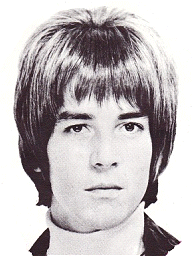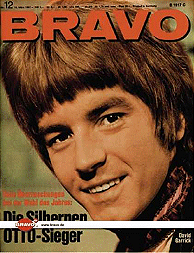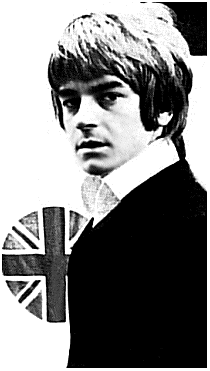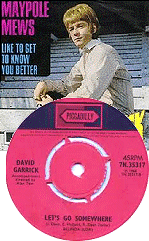Sixties
City presents
a wide-ranging series of
articles on all aspects of the Sixties, penned by the creator of the iconic
60s music paper Mersey
Beat
|
Sixties
City presents
a wide-ranging series of
articles on all aspects of the Sixties, penned by the creator of the iconic
60s music paper Mersey
Beat
|
|||||
|
 |
The
singer was born Phillip Darryl Core in the Knotty Ash area of Liverpool
on 12th September 1946. His love of music was inspired by Mario Lanza
and the work of Mozart and Beethoven and he began to sing in church choirs
at an early age. When he was 14 David was chosen to become a member of
the Birkenhead Operatic Company and he then won a scholarship to La Scala
in Milan. He was thrilled to discover that his coach was Skippi, who had
also coached his idol Mario Lanza. However, after two years David decided
to throw it all away.
He recalls, “I was stuck in the chorus, going nowhere, so I packed it in. I was stupid, really, I suppose, but I was still only a teenager and I just couldn’t hack it. I wasn’t cut out to be a great tenor, I suppose.” Back on Merseyside he became involved with some local bands such as Roy & The Dions and Creation and also used to frequent the Cavern where he was known as ‘The Opera Singer.’ One evening he took to the Cavern stage and sang a piece from ‘Pagliacci’ to great applause. Another evening when he was at a Liverpool club with his sister, he noticed a sartorially dressed man staring at him. He was then approached by the man who said that although he hadn’t heard him sing, on looks alone he would make a fine pop star. The man’s name was Robert Wace, co-manager of The Kinks. David was invited to London to meet the other co-manager Grenville Collins and an audition with Pye Records was arranged. Wace decided that Phillip Core wasn’t a good enough stage name and when the two were discussing something more suitable, Wace noticed they were standing outside the Garrick Theatre and suggested the name David Garrick. As he was under 21, the Pye recording contract had to be signed by his father, who didn’t bother reading it. David recalls that the contract was the worse thing that happened in his career. John Schroeder, who had recorded so many Mersey groups, including the hit albums ‘This is Mersey Beat’, became his recording manager, although the first two releases, ‘Go’ in April 1965 and ‘One Little Smile’ didn’t chart, even though the latter was voted a hit on ‘Juke Box Jury'. |
 |
He was then sent a copy of ‘Lady Jane’, a track from the Rolling Stones
album as Mick Jagger had suggested that it would suit David’s dramatic style.
David then went on tour with Gene Pitney and The Troggs, backed by his former
Liverpool outfit Creation. His next release was ‘Dear Mrs Appleby’, released
in September 1966, which reached No22 in the British charts.
David still hungered to record classical music and his ‘Ave Maria’ topped the Charts in Ireland and Holland and was a hit in other European countries, although Pye refused to release the other classical tracks which David had recorded. Barry Gibb was a close friend and while the two of them were having a drink one night, Barry decided to write a number for him and penned ‘Maypole Mews’ in 20 minutes. He also recorded another Bee Gees number ‘Spicks & Specks’, although Pye didn’t release it. Despite the European success, his records didn’t sell in Britain and following the release of ‘Poor Little Me’ in September 1969, Pye decided to terminate the contract. Robert Wace also told him that that he and Collins had decided they could no longer manage him, saying “I’m afraid you’re finished.” David remembers, “But by then, I’d had more than enough of all the intrigue, two-facedness, and double-dealings of pop music. I’d been badly screwed financially, due to the contract we’d signed with Piccadilly, I hardly saw any record royalties – and so I decided to get out.” He then began to appear on the cabaret circuit in the North of England, happy to be able to perform dramatic ballads, and Mario Lanza and Pagliacci routines – sometimes even going on stage in a clown’s outfit. He was then spotted by Liberace, who had heard him perform ‘Ave Maria’ and was impressed by his operatic voice. He invited David to appear on tour with him in the United States, where David was to sing four songs. On his return he recorded some numbers for Columbia, which weren’t successful. After problems with other managers and agents he had hooked up with, he decided to give up his career in music and moved to South Africa where he opened a night club in Johannesburg. However, he refused to pay protection money and his club was burnt down a month later. For the next couple of years he toured South Africa performing in cabaret. David then had a nervous breakdown and decided to end his career in music. |
 |
 |
His sister had married a millionaire and invited him to live on their various
cruise ships on the Nile and he spent the next six or seven years just living
the life-style, acquiring a sun tan and not worrying about anything. He
then received a call from an agent in Holland offering him five thousand
pounds to make a single appearance on a live TV show. He decided to give
it a go – and the response was huge, even though he hadn’t performed in
Europe for twenty years or so. The offers poured in and he’s never looked
back since. Germany, Austria, Poland, throughout the Eastern block, his
popularity continued. His repertoire contained sixties pop, R&B material
from the likes of James Brown and Wilson Pickett, dramatic ballads and some
classical numbers. During his career, with 22 singles issued, he has sold over 20 million records and in Germany he was voted ‘Artiste of the Year’ twice in 1966 and 1967 and Best Dressed Man by readers of Bravo magazine twice in 1966 and 1967. He also won the Golden Rose Award twice during the same years. His 1999 album ‘Appasionata’, which took him two years to record, is a tribute to Mario Lanza and was an album he’d promised his mum he’d record – and it’s an album no other pop singer has ever attempted. Included in the 14 classical tracks are ones from live appearances – ‘Santa Lucia’, live at Trentham Gardens; ‘L’Elisire D’Amour’, live at St. George’s Hall, Liverpool; ‘The Lord’s Prayer’ and ‘Panis Angelicus’, both recorded live at Liverpool Cathedral and ‘La Donne E Mobile’, live at the Winter Gardens. David currently has three homes, one in Egypt, one in London and one in Liverpool.
|
|
Article
Text
UK
web hosting by
|